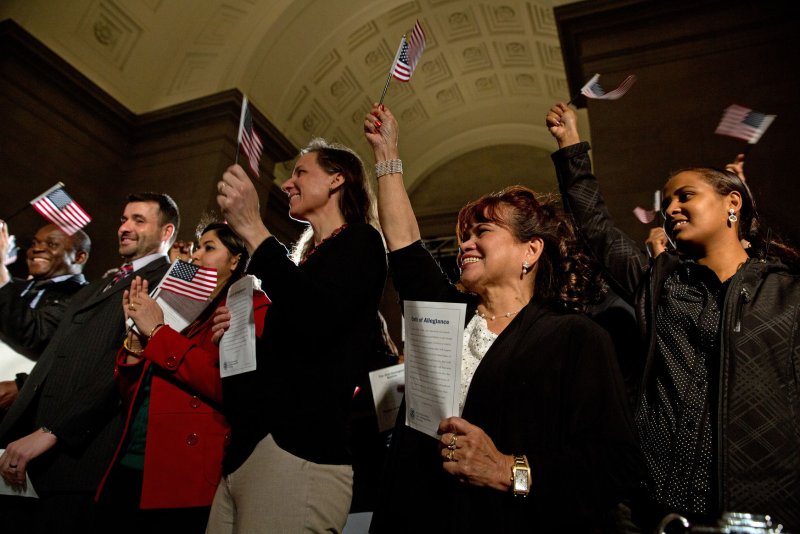Naturalized citizens raise their American flags as the roll is called during a ceremony for new U.S. citizens at the National Archives in Washington, DC on Tuesday, December 15, 2015. New research suggests maintaining a connection to the both the cultures of one's origin country and to that of America is beneficial for Latino/a adolescents. Pool Photo by Martin Simon/UPI |
License Photo
COLUMBIA, Mo., Feb. 10 (UPI) -- New research suggests biculturalism has positive effects on young Mexican-Americans.
According to new survey data, Mexican-Americans who are connected to both American and Latino culture tend to have higher self-esteem and engage in prosocial behaviors, like empathizing with others.
The surveys were conducted researchers at the University of Missouri and included the responses of 574 Mexican-American adolescents living in Phoenix, Ariz.
"Regardless of the nationality of a parent, one thing remains constant -- parents want their children to have prosocial tendencies," Gustavo Carlo, a professor of diversity at Missouri's College of Human Environmental Sciences, explained in a press release.
"Parents want their kids to have self-esteem, to care for others and be confident: traits that lead to relatively high levels of well-being," Carlo added. "This is particularly true for Latino immigrants working to make a better life for their children in the U.S."
Survey participants were asked to answer queries about their ethnicity, what language they spoke at home, their willingness to help others and their self-esteem.
Though most foreign born residents in the United States work to maintain ties to their national heritage while adapting to American culture, adolescents may face added pressures at home to adhere to tradition and resist conformation -- while facing the opposite at school or in the workplace.
The latest findings suggests a balance may be best.
"We found that adolescents who can adopt both their culture of heritage and mainstream culture and those who can navigate between the two worlds are more likely to be confident, have higher self-esteem and help others," Carlo said.
"However, not all adolescents have the luxury to navigate both worlds," Carlo continued. "For example, one may want to fit in with their peers but, for a variety of reasons, is unable to do so. Then the next best alternative is to remain connected with one's culture of origin to improve overall well-being."
The new research will be published this spring in the Journal of Latina/o Psychology.















